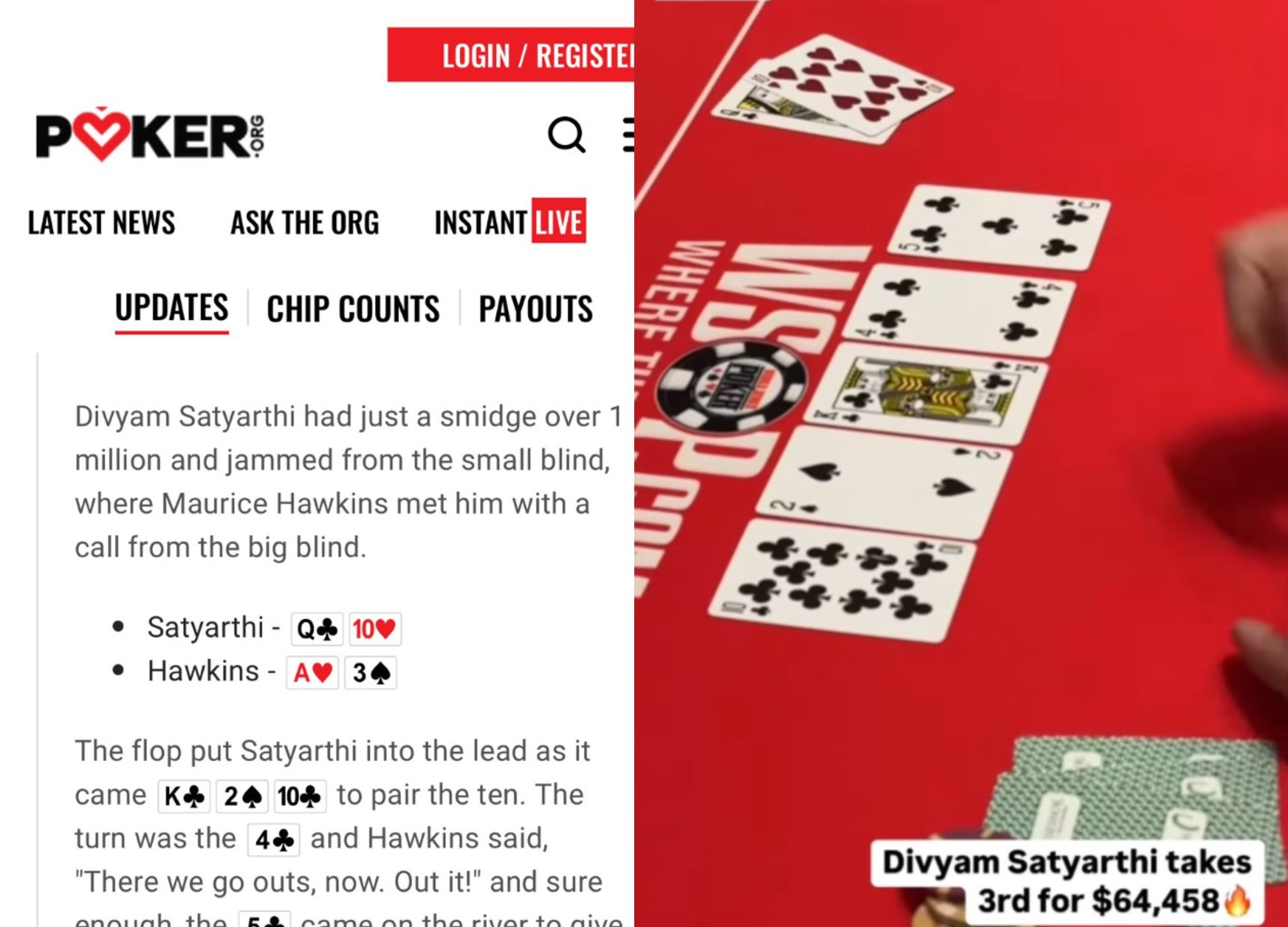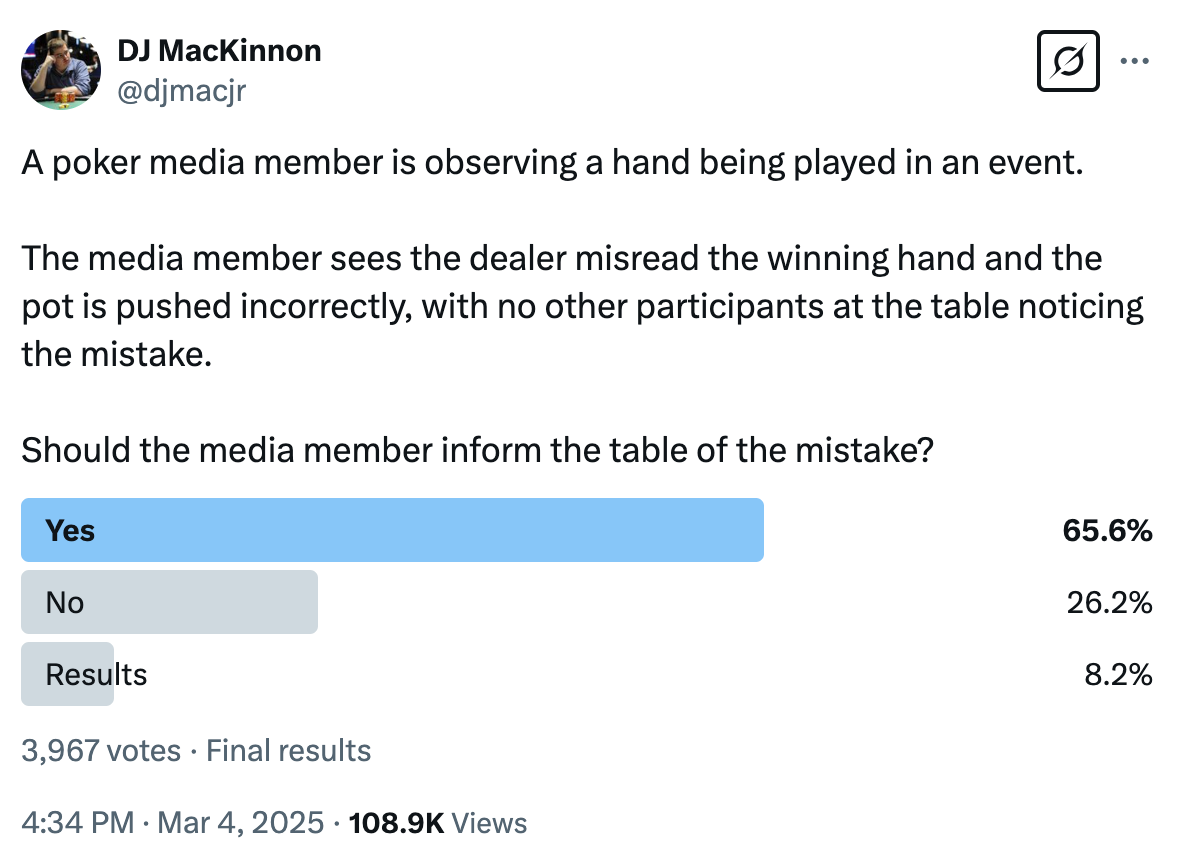Poker Reporters Are Meant To Observe, Not Enforce
The controversy over Maurice Hawkins' recent WSOP Circuit win brought attention to whose responsibility it is to make sure the game runs fairly.

Anybody who has been on Poker Twitter this week has no doubt noticed the maelstrom that erupted after Maurice Hawkins won his 18th WSOP Circuit ring in Baltimore. Often a lightning rod for controversy, Hawkins isn’t the main reason for all the hubbub this time.
With three players left in the WSOP Circuit Main Event at Horseshoe Baltimore, Hawkins and Divyan Satyarthi were all in preflop with Hawkins holding Ah 3s against Satyarthi’s Qc Th. The board ran out Tc 2s Kc 4c 5c with the river giving Hawkins a straight and Satyarthi a flush.
The dealer mistakenly mucked Satyarthi’s hand and awarded the pot to Hawkins, eliminating Satyarthi. Hawkins then went on to dispose of Dan Chalifour in second place to win the tournament for his record-setting 18th career Circuit ring.
After the details of the hand were correctly reported by poker.org, a screenshot of that reporting was shared on Twitter. This prompted poker pro DJ MacKinnon to run a poll on his Twitter account asking whether or not people believe the reporter should speak up in a situation like this.
Nearly 4,000 people voted on McKinnon’s poll, with around 65% of those voting saying that the reporter should step in and alert the dealer to the error. The discussion that came from that poll was spirited with players and poker media alike taking a position.
In the Hawkins hand, two things are very clear. First, the dealer didn’t do his job. Second, the floor person didn’t do theirs either. Each had a responsibility to the players in the hand and to the host casino to read the board correctly and award the pot to the rightful winner. Unfortunately for Satyarthi, that didn’t happen.
There is one other thing that is quite clear that has seemingly been overlooked through the discussion. The reporter did his job. We know this because there is clear video footage of the hand shot by the reporter as part of poker.org’s coverage of the event. That is quite literally the reporter’s job and responsibility here. The one thing that the reporter could have done - and should have done - was pointed out in the coverage that the pot was wrongfully awarded to Hawkins. It had a material impact on the outcome of the tournament for all three players still in. That’s the news here. The proof is that that’s what is still being talked about - not Hawkins’ record-breaking performance.
The reporter needs to be an impartial observer and document what happens and not influence them. They are unique in the sense that they are to be seen and not heard. Unlike a railbird, a reporter is not a casual observer, and unlike a player or dealer or floor person, they have no interest in the outcome of the event.
In the midst of hot takes, one well respected member of the media provided a well-grounded perspective on the issue based on personal experience. Rachel Winter, an award-winning photographer who has been shooting poker events for four years, pointed out a pair of times she’s been in this situation and how she handled it.
This prompted a response from Shaun Deeb, which came across with the gentle touch Deeb is known for in situations where he’s passionate about one side of any particular argument.
The Human Resources nightmare of firing somebody for doing what Winter described aside, Deeb also brings up the “fly on the wall” expectation. While Deeb might be extreme in his tone, the voice of a six-time WSOP bracelet winner who has long been an advocate for game integrity carries some additional weight.
Not long after, Winter’s husband and poker pro Brian Winter posted the following which inadvertently gets to the heart of the issue.
Every single person in poker wants the pot to be awarded to the right player However, the expectation of neutrality from the media doesn’t simply mean they don’t play favorites with how they cover or write about certain players but also in how they cover an event and happens on the felt.
Apply McKinnon’s hypothetical scenario to another arena. Imagine the outrage if Erin Andrews, while covering the Super Bowl for FOX Sports, noticed that Cooper DeJean had stepped out of bounds about 10 yards before scoring his touchdown after intercepting Patrick Mahomes and mentioned this information to Andy Reid allowing him to challenge the ruling on the field.
Ensuring game integrity isn’t part of a reporter’s job because when something happens, good or bad, they have to be able to report on it. The reporter works for the media outlet and their obligation is to them only. Expecting reporters to speak up in this scenario sets a dangerous precedent and opens a can of worms that has myriad of consequences that can’t be ignored.
What if a reporter is not familiar with the game type being played (say in Dealer’s Choice events) and isn’t confident enough to speak up when the dealer pushes the pot to a player with a 9-5 in Deuce to Seven instead of a player with an 8-6. Is that reporter suddenly less qualified to do the job they were hired to do?
What if a reporter sees a floor person apply a ruling that is incorrect? Something the reporter knows is wrong? Should they tell the player involved to escalate the issue until the previous floor person’s supervisor is at the table?
In each of these scenarios the answer is no. The reporter serves as an impartial observer expected to report what happened accurately and fairly. While “cards speak” is the rule in poker, that’s for players, dealers, staff, and even railbirds to adhere to as they have no obligation to remain neutral (and in fact aren’t neutral as they have a vested interest in ensuring the game runs fairly.)
It’s also important to note that none of this discussion could have taken place had the reporter not been focused on doing his job properly. We wouldn’t know of the error that was made and we wouldn’t have video or photo proof. (In fact, some people assumed that the reporter got Hawkins’ hand wrong, only to be proven that it was correct.)
One thing being overlooked here is that the furor was stoked in part by the fact that Hawkins was the beneficiary of this mistake. Saying he’s a polarizing figure is like saying that liver and onions would be an unpopular choice to bring to a neighborhood barbecue. He’s brash and cocky and unapologetic about it. Even in the interview after his win he was thumping his chest through his words.
On top of that, he’s also alleged to have stiffed or slowpaid some of those who have backed him or loaned him money in the past. Because of this, a lot of his colleagues who frequent WSOP Circuit stops don’t like him, don’t respect, and don’t want to see him win.
Patrick Leonard, another well-respected poker pro with a reputation for pointing out things which call into question the integrity of the game, watched the video of the hand being played out and pointed out a few things that bothered him about how the hand itself was handled.
Barry Carter, a longtime poker journalist and author, then pointed out that the video was “dodgy as hell” in regards to some of the things Leonard mentioned.
Again, none of that discourse would be possible had the reporter not done his job properly. While filming the hand the reporter is likely thinking about making sure he’s getting the hand framed properly, that the mic is working, that he may have to publish this video quickly if an elimination occurs, that he’ll also have to write the hand up for poker.org’s live coverage.
Poker is best served when media are allowed to report on and cover events without also having the expectation that they work in conjunction with dealers or floor staff to uphold integrity of the game. Media can play a role in game integrity by reporting truthfully on what happens at events and bringing issues of integrity to light.
Could Phoenix Handle a Major Event?
Finding a venue to host a *new* major poker tournament in North America - in this case a hypothetical $5,000 buy-in with a $5 million guarantee - presents a few different options, but it seems like poker player might be excited to get to Phoenix, Arizona.
The ideal host for such an event is located just 20 minutes from Phoenix Sky Harbor International Airport. The Talking Stick Resort in Scottsdale, Arizona has 69 tables and has hosted the Arizona State Poker Championship for 18 years. The 2024 event had a $1,130 buy-in and drew 2,860 entries.









